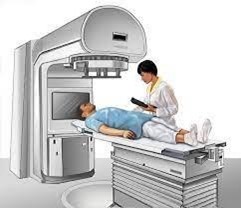The nurse is teaching a client with cancer about skincare for the portal site receiving external beam radiation. Which client action regarding skin care indicates a need for further teaching?

Applies prescribed lotions to the radiation site.
Washes the radiation site with antibacterial soap and water.
Wears clothing to cover the radiation site.
Dries the area with patting motions after taking a shower.
The Correct Answer is B
Choice A rationale:
Applying prescribed lotions to the radiation site is generally a recommended part of skin care during radiation therapy, as it helps keep the skin moisturized and reduces irritation.
Choice B rationale:
Washing the radiation site with antibacterial soap and water is not recommended. Clients undergoing radiation therapy are typically advised to use gentle, mild soaps and to avoid scrubbing or using harsh cleansers on the treated area. Antibacterial soap may be too harsh and could lead to skin irritation.
Choice C rationale:
Wearing clothing to cover the radiation site is a good practice to protect the area from sun exposure and potential irritation.
Choice D rationale:
Drying the area with patting motions after taking a shower is the correct way to dry the radiation site, as it minimizes friction and reduces the risk of skin damage.
Nursing Test Bank
Naxlex Comprehensive Predictor Exams
Related Questions
Correct Answer is A
Explanation
Choice A rationale:
Exploring changes in life that have occurred after the loss is the first action the nurse should take. This allows the nurse to assess the client's grief, identify specific stressors, and understand how the loss is impacting the client's daily life and emotional well-being. It provides valuable information for tailoring further interventions and support.
Choice B rationale:
Suggesting the need for a psychiatric consultation may be premature as the nurse should first assess the client's grief and coping mechanisms. Referral for psychiatric consultation should be considered if the client's emotional distress is severe, persistent, or significantly impacting their functioning.
Choice C rationale:
Offering a referral to pastoral counseling may be appropriate for some clients, but it should not be the first action. The nurse should assess the client's needs and preferences before making such a referral.
Choice D rationale:
Encouraging attendance at a local support group can be beneficial, but it should not be the initial step. The nurse should first assess the client's current emotional state and needs to determine the most appropriate interventions.
Correct Answer is D
Explanation
Choice A Rationale:
While emotional expression and ventilation can be therapeutic, it may not be the most appropriate coping strategy for someone with depression who may already be overwhelmed by negative emotions. Ventilating emotions without a structured approach might not provide the desired relief and can even exacerbate feelings of distress.
Choice B Rationale:
This choice may not be suitable for someone with depression because it could lead to further neglect of their own needs and contribute to feelings of guilt or exhaustion.
Choice C Rationale:
While relaxation techniques can be helpful, reducing the effort to solve problems may not be the most effective strategy for individuals with depression. Avoidance of problems can perpetuate feelings of helplessness and hopelessness.
Choice D Rationale:
For a client with depression who is struggling with handling personal circumstances, focusing on small achievable tasks can be a helpful coping strategy. Breaking down larger problems into manageable steps can reduce feelings of overwhelm and gradually improve the client's sense of accomplishment and self-efficacy.
Whether you are a student looking to ace your exams or a practicing nurse seeking to enhance your expertise , our nursing education contents will empower you with the confidence and competence to make a difference in the lives of patients and become a respected leader in the healthcare field.
Visit Naxlex, invest in your future and unlock endless possibilities with our unparalleled nursing education contents today
Report Wrong Answer on the Current Question
Do you disagree with the answer? If yes, what is your expected answer? Explain.
Kindly be descriptive with the issue you are facing.
